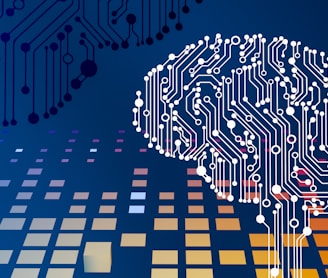The Role of AI and Automation in Modern CRM
This blog explores the pivotal role of Artificial Intelligence (AI) and automation in modern Customer Relationship Management (CRM). It highlights how these technologies are transforming customer engagement and business efficiency in the digital age. The article details the impact of AI in data analysis, personalization, predictive analytics, and customer support, while also showcasing how automation enhances data management, lead nurturing, and sales processes. It addresses the benefits, challenges, and considerations of integrating AI and automation into CRM, emphasizing their significance in delivering exceptional customer experiences and driving data-driven decisions.
Introduction
In today's rapidly evolving business landscape, the significance of customer relationships cannot be overstated. Customer Relationship Management (CRM) has transcended its origins as a mere contact database and has transformed into a dynamic strategy that nurtures meaningful connections with customers. In this digital age, the integration of Artificial Intelligence (AI) and automation has emerged as a revolutionary force, redefining CRM processes. This article delves into the profound impact of AI and automation on customer engagement and business efficiency within modern CRM.
Understanding Modern CRM
Modern CRM extends beyond the mere management of contact details; it encompasses the creation of personalized and immersive experiences for customers. It entails tracking interactions, discerning preferences, and predicting future behaviors. Achieving this level of understanding demands the analysis of substantial data volumes, where AI and automation play pivotal roles.
The Role of Artificial Intelligence
Artificial Intelligence, particularly in the guise of machine learning algorithms, assumes a central position in modern CRM. Here's how:
Data Analysis
AI algorithms possess the capability to scrutinize data from diverse sources in real-time. This empowers businesses to gain profound insights into customer behavior, facilitating an understanding of what customers desire, when they desire it, and how they prefer it delivered.
Personalization
AI contributes significantly to the creation of hyper-personalized experiences. By scrutinizing historical data and current interactions, AI can recommend products, services, or content that align with individual customer preferences.
Predictive Analytics
AI's predictive prowess extends to forecasting future customer behavior. For instance, it can prognosticate which customers are likely to churn or who might make a purchase in the near future. This invaluable information informs the crafting of marketing and retention strategies.
Chatbots and Virtual Assistants
AI-driven chatbots and virtual assistants serve as invaluable assets in handling routine customer inquiries. By doing so, they liberate human agents to focus on more intricate issues, offering 24/7 availability for immediate responses to customer queries.
The Role of Automation
Automation complements AI in several key aspects within the CRM context:
Data Entry and Management
Automation tools excel at efficiently capturing and organizing customer data. This minimizes the risk of manual errors and ensures the precision of data.
Lead Nurturing
Automated email marketing campaigns are instrumental in nurturing leads by delivering targeted content and timely follow-ups. These efforts maintain the engagement of potential customers until they are ready to make a purchase.
Streamlining Sales Processes
Automation streamlines sales operations by effectively assigning leads to the appropriate sales representatives, tracking interactions, and automating follow-up procedures. This ensures that no potential sales opportunity is overlooked.
Customer Support
Automated ticketing systems adeptly categorize and prioritize customer inquiries, guaranteeing faster response times and superior service.
Benefits of AI and Automation in CRM
The incorporation of AI and automation brings forth a multitude of advantages:
Enhanced Customer Engagement
AI-driven personalization and the automation of routine tasks enable businesses to engage with customers more effectively. Customers receive pertinent content and prompt responses, resulting in heightened satisfaction.
Efficiency and Productivity
Automation alleviates the burden of manual, time-consuming tasks, permitting employees to channel their efforts into high-value activities. This not only enhances efficiency but also boosts job satisfaction.
Data-Driven Decision Making
AI provides data-driven insights that empower informed decision-making. It's no longer a matter of conjecture; it's about possessing the knowledge of what strategies work and what doesn't.
Scalability
As businesses expand, the management of customer relationships can grow intricate. AI and automation systems are adept at scaling seamlessly to handle augmented data and interactions.
Challenges and Considerations
While AI and automation offer a plethora of advantages, certain challenges warrant consideration:
Data Privacy
The handling of customer data necessitates strict adherence to data privacy regulations. CRM systems must guarantee data security and compliance.
Implementation Costs
Integrating AI and automation into CRM can be a substantial financial undertaking, particularly for smaller businesses. However, the long-term benefits often outweigh the initial costs.
User Adoption
Employees may exhibit reluctance in adopting new systems, fearing that automation might jeopardize their job security. Adequate training and change management procedures are imperative to address such concerns.
Conclusion
AI and automation have transitioned from futuristic concepts to indispensable components of CRM. Businesses that embrace these technologies gain a competitive edge by delivering remarkable customer experiences, enhancing efficiency, and making decisions informed by data. As customer expectations continue to soar, the role of AI and automation in modern CRM will become increasingly pivotal in establishing enduring, profitable customer relationships.
FAQs
1. How does AI enhance customer engagement in CRM?
AI enhances customer engagement by enabling hyper-personalization, predictive analytics, and immediate responses through chatbots.
2. What is the significance of automation in CRM?
Automation streamlines processes, ensures data accuracy, and maintains customer engagement, particularly in tasks like lead nurturing and customer support.
3. Are there challenges in implementing AI and automation in CRM?
Yes, challenges include data privacy compliance, initial implementation costs, and concerns about user adoption among employees.
4. How does AI contribute to data-driven decision-making in CRM?
AI provides data-driven insights derived from customer behavior analysis, aiding businesses in making informed decisions.
5. What is the future of AI and automation in CRM?
The future involves even more sophisticated AI applications, such as predictive customer behavior modeling and enhanced automation of complex processes.



